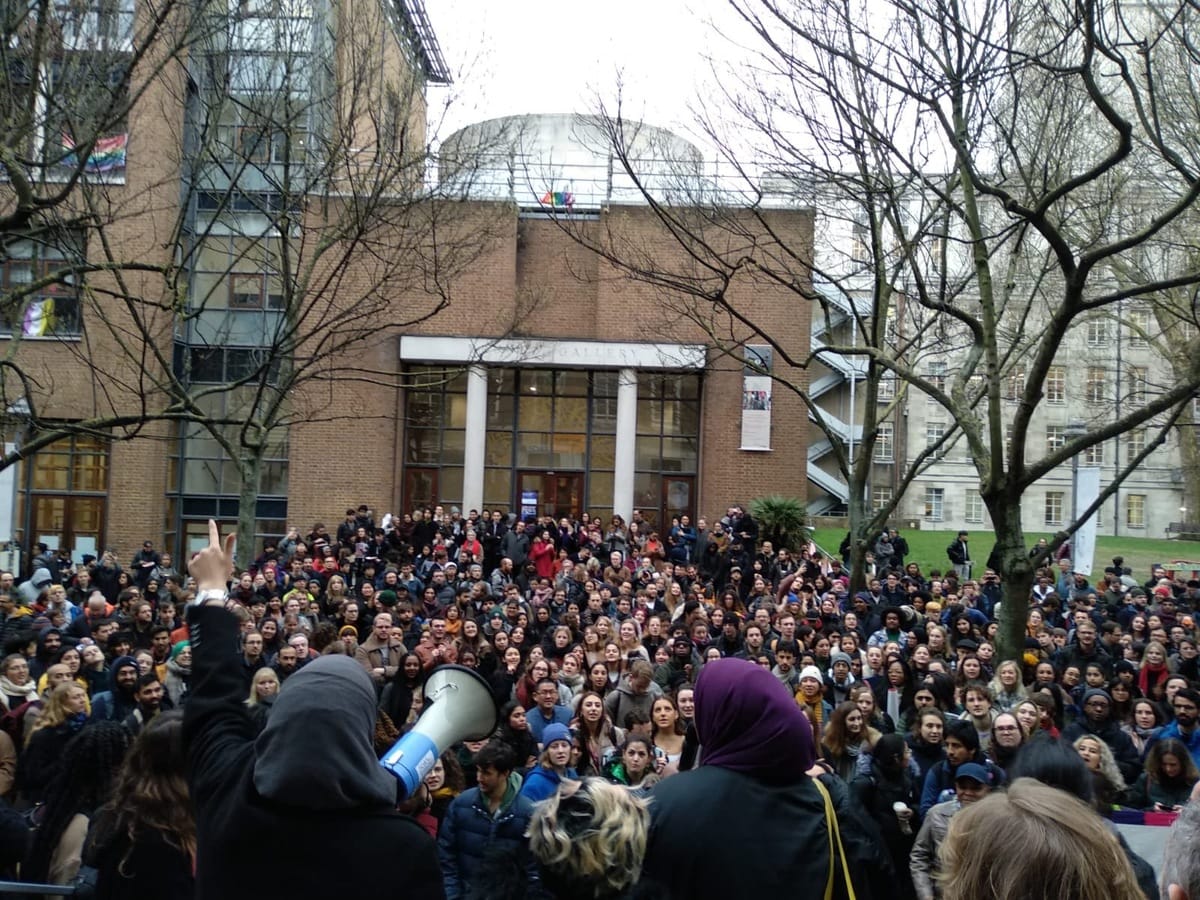Fractionals ‘attacked’: Latest round of cuts at SOAS announced

By Will Durrant, BA History and Sabrina Shah, BA International Relations
Students and academic staff have launched fresh protests after new cuts to research leave and reviews of departmental budgets are announced.
The latest round of protests are aimed at the School’s management body, which comprises some of the best paid staff at SOAS. The Students’ Union, the University and Colleges Union (UCU), Fractionals for Fair Play (FFFP), the School’s academic steering body, and the student-led SOAS Assembly consortium have all moved to oppose the latest restructure. As they stood at the end of January, SOAS’s plans include major cuts to the fractional teaching budget in the 2020/21 academic year, and a cut to sabbatical research leave funded by SOAS. Fractional staff are employed on ‘casual’ or fixed-term contracts and do not work at SOAS as full-time staff.
After an all-school assembly meeting with four members of the directorate last month, members of the SOAS community have raised questions about the directorate’s handling of the School’s financial crisis. Last year, the Spirit revealed that the School’s cash reserves would run out by the end of 2021.
The current dispute came to light after FFFP, a long-running campaign to award temporary teaching staff permanent contracts, sent a statement to staff and students noting changes to fractional workers’ terms and conditions of employment, effective from the next academic year. FFFP says that SOAS management will abolish fractional teaching posts, ‘effectively firing large numbers of people’ who have seen drastic cuts to their teaching hours. FFFP warns that this will be to the detriment of SOAS’s quality of teaching as lecturers and markers will be ‘woefully overstretched.’
The group warns that the move to suspend fractional teachers’ contracts will ‘disproportionately affect … those of us already on the margins of academia and the university,’ especially staff who are women, Black, or People of Colour.
Stephen Hopgood, the School’s Vice-Director, appeared to deny that fractional staff would have their contracts suspended in the new year. At the all-school meeting last month, he said: ‘there will continue to be fractionals at SOAS. All we’ve done is, for one year, paused research leave that’s funded entirely by the School.’
Hopgood also said that fractionals are ‘absolutely not’ being sacked, but that a ‘review’ of casual contracts is a ‘standard’ procedure which takes place every year. He did not deny that the directorate is making a ‘major cut’ to the fractional budget at SOAS, nor that some staff will have their contracted teaching hours reduced to zero, as FFFP highlights.On the suspension of academic research leave funded by SOAS, the School’s academic steering group, the Academic Senate, seemed frustrated with the decision to suspend research leave. An email sent to staff on January 21 called for an extraordinary meeting to address the cuts which were made ‘seemingly without consultation with academic research leaders or union representatives.’
The Senate’s email hinted that there may be more cuts to come: ‘a number of staff are now asking questions about the wider situation and what measures are planned.’104 academics signed the petition for an extraordinary meeting. The list of signatories includes several course convenors and heads of departments.Campaigners warn that cuts to research at SOAS in any form could threaten the School’s international reputation as a centre for knowledge on Africa, Asia, and the Middle East. The SOAS Library was designated one of five National Research Libraries by the now-defunct Higher Education Funding Council for England (HEFCE) in 2011.
The protests against cuts gained traction quickly.A major student walkout took place on January 23, which boasted almost 500 students and 150 staff. The student-led SOAS Assembly, which includes representatives from the Preventing Prevent, BDSxSOAS, Demilitarise SOAS, and Justice for Workers campaigns, later presented Hopgood with a set of demands, all of which called for the senior management to consult students and staff on their plans.Hopgood ceded to the demands, prompting the all-school meeting on January 27.In the meeting, students grilled Hopgood and other members of the directorate – including Baroness Valerie Amos – on the cuts and their handling of the financial crisis. The Assembly appeared most concerned with workers’ rights and pay conditions for SOAS staff. The plans put pressure on fractionals to find new sources of income. Lecturers’ workloads will be increased, prompting concerns that staff will be ‘overstretched’ and stressed.Amos defended the cuts: ‘our situation is so serious that nothing can be taken off the table.’But this angered members of the forum. Students’ Union co-president Youssra Elmagboul hit back that cuts to managers’ salaries should also be on the table, so as not to take funding away from teaching and research, which students say should remain at SOAS’s core.It is thought that overinflated management structures and ‘pointless’ meetings cost the UK economy somewhere in the region of £45billion, according to economists at consultancy.uk. The SOAS Assembly hopes that there will be more victories to come. The group has told the Spirit that they now hope to gain support for the cause at department-level. Meanwhile, protests continue.
An earlier version of this article suggested that fractional workers will not work at SOAS next year. This is not the case.




